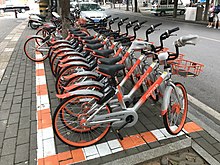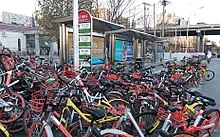Mobike
[8] In December 2018, Hu Weiwei resigned as chief executive for "personal reasons" and was replaced by Eric Yu Liu .
[10][11] Mobike operates in Chinese cities include but are not limited to Beijing, Shanghai, Guangzhou, Shenzhen, Chengdu, Lanzhou, Ningbo, Xiamen, Foshan, Zhuhai, Changsha, Hefei, Shantou, Haikou, Deyang, Nanning, Guiyang, Xi'an, Wenzhou, and Wuhan.
[15] In Osaka, to gain traction for its e-bike business, Panasonic partnered with Chinese Mobike to explore the possibilities of an electric-bike-sharing service in Japan.
[16] On 31 August 2017, Mobike announced its official launch in Thailand with its partnership with AIS, Central Pattana and Kasertsat University.
[17] On 6 September 2017, Mobike officially launched in Malaysia, with the first bikes being rolled out in Setia Alam[18] and Cyberjaya just a month later.
In November 2017 and February 2018, Mobike launched its service in Sydney and the Gold Coast, Queensland, Australia respectively.
[19][20][21] In May 2018, Mobike launched its operations in Israel in cities including Tel Aviv, Ramat Gan, Givatayim, Rehovot and Kiryat Bialik.
On 11 March 2019, Mobike requested to surrender its bicycle sharing license and cease all operation in Singapore.
In Italy, Mobike began operations initially in Florence in July 2017,[25] followed by Milan in August,[26] Turin and Bergamo in November,[27][28] Pesaro and Mantua in March 2018,[29][30] Reggio Emilia in May[31] and Bologna in June.
The ceremony was attended by Chantal Blaak, the 2017 world champion cycling women's road race.
[35][36] Mobike quickly expanded in Germany by launching in Düsseldorf in May 2018, followed by Cologne in July 2018 and Hannover in September 2018.
[40] Spain was Mobike's 19th country of operation, and was in support of the city's urban mobility strategy, calling for increased use of low carbon transportation.
[42] In Albania, this bike-sharing system was launched in Tirana on 8 June 2018,[43] but in the beginning of 2020 the service resulted unavailable.
[51][52] As described by the company, Mobike is intended to solve the last mile issue in which commuters face the problem of being stuck a bit too far from their destination to walk, but too close to justify the cost or delay of finding a taxi.
Mobike has partnered with Qualcomm[53] (using their IoT chip MDM9206) and Gemalto[54] for the use of NB-IoT technologies to provide connection for the bikes.
Instead of conventional wire spokes, it uses five sets of two thick, parallel, metal rods positioned at 72° from each other to improve durability and lower maintenance costs.
The livery is black for the seat, handlebars and the lock, orange for the wheel and metallic silver for the body.
The Mobike Lite comes with a net-like metal basket and has a solar panel that powers the QR lock and GPS tracker.
[55] According to a company press release, small batches of second generation Mobikes, both Classic and Lite, are being deployed in areas of service.
The colour scheme of the second generation Mobike Lite is changed to orange for the inner rim, and reverts to black for the tyre.





